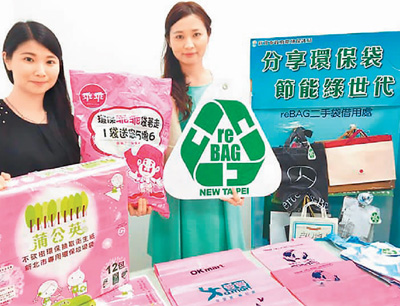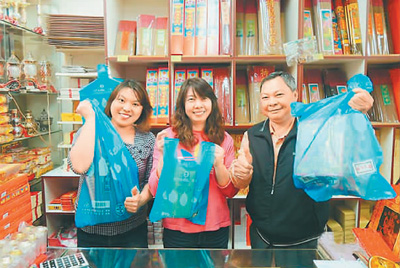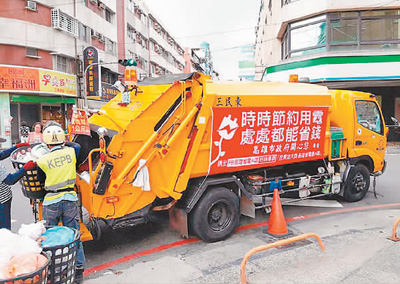Taiwan Province: The collection of garbage fees with bags pays attention to the great increase in recovery rate.

The "universal bags" of different brands in New Taipei City use snacks and toilet paper packaging bags, and combine three functions of packaging, shopping bags and garbage bags.
(Provided by New Taipei Environmental Protection Bureau)

(Provided by Taipei Environmental Protection Bureau)

Kaohsiung plans to try out the garbage collection with bags in industrial areas before the end of the year. If the response is good, it will be gradually extended to other areas.
(Provided by Kaohsiung Environmental Protection Bureau)
Garbage charges are aimed at municipal solid waste to compensate the cost of waste collection and treatment, and at the same time encourage the reduction of waste production, reflecting the polluter pays principle. How to collect and how much to collect need to consider all aspects. Before 2000, Taiwan Province adopted the method of collecting water charges. The more water is used, the more garbage fees will be paid. Since then, it has been implemented in some counties and cities by measuring the quantity and collecting with bags (designated garbage bags must be purchased in advance, and forged garbage bags will be punished).
According to Taiwan media reports, both Taipei and New Taipei have been collecting garbage fees with bags for many years, but when the measure was first introduced, it encountered strong opposition. Nowadays, it is gratifying to see that the amount of garbage has been greatly reduced by 50% to 60% and the amount of resources recovered has increased by 50%, which can be described as remarkable results. Not only that, the garbage charge is much lower than before. It seems to be an ideal scheme for environmental protection, but some counties and cities have not been on the road so far. What are the reasons behind it?
The amount of garbage decreased and the recovery rate increased greatly.
Lu Shichang, deputy director of the Taipei Environmental Protection Bureau, said that since July 2000, Taipei has fully implemented the garbage fee with bags, encouraged people to do garbage sorting, and persuaded and punished uncooperative people or businesses by randomly breaking bags. Before the move was launched, officials were sent to various districts to hold symposiums, and almost all the mayors opposed it. However, at the insistence of then Mayor Ma Ying-jeou, the bag-based levy was implemented as scheduled, and it was finally accepted by the public under the condition that it could not be more expensive than the water fee.
Lu Shichang said that at the beginning, I was worried that Taipei citizens would throw garbage into neighboring counties and cities. The police station and environmental protection personnel even stood by the Lianwai Bridge to check vehicles on the first day of the implementation of the measures. Unexpectedly, the utilization rate of special garbage bags was as high as 97% on the first day, and the recycling rate of recyclable garbage also reached 58% from 2.3% now.
Because of the successful precedent of Taipei City, New Taipei City also started a pilot project from Shenkeng Township with a relatively small population at that time in 2008, and gradually extended to the metropolitan areas such as Shijie, Yingge, Woods and Banqiao, and was fully implemented after being upgraded to a municipality directly under the Central Government in 2010. The amount of garbage has also decreased from 2,497 tons per day in 2008 to 1,360 tons per day by the end of 2016, with a drop of 45%, and the recovery rate has also increased from 30% to 53% in 2016.
There is a gap between urban and rural areas and the promotion is inconsistent
Liu Minglong, director of the Taipei Environmental Protection Bureau, shared his experience that the number of special garbage bags should be sufficient for the public to obtain easily, and the needs of households and enterprises should be taken into account, and seven specifications, ranging from 3 liters to 120 liters, should be provided. Sun Zhongwei, chief of recycling resources of the New Taipei Environmental Protection Bureau, said, "Collecting with water means using more water and paying more (garbage fee); The collection with the bag is how much to throw and how much to pay. "Let the people realize that the bags (fees) thrown out are all garbage removal fees.
Li Xianwei, director of environmental protection of Tainan City, said that after the implementation of Taipei City and New Taipei City, they did not push south. The most important problem was the gap between finance and urban and rural areas. The Taipei municipal government heavily subsidizes the cost of garbage bags, but Tainan is financially embarrassed. If it cannot be subsidized like Taipei, the price will be at least twice that of Taipei. Cai Mengyu, director of environmental protection in Kaohsiung City, said that it is necessary to consider whether citizens can afford to buy garbage bags and where people in rural areas can buy them. We can’t just follow the example of Taipei metropolitan area. Shen Zhixiu, director of environmental protection of Taoyuan City, also said that it is difficult to implement in many remote areas of Taoyuan.
Bai Zhirong, director of environmental protection in Taichung City, said that it is necessary to carefully evaluate and complete the package, and it also takes time for the people to develop habits and not to implement it rashly. Bai Zhirong said that the implementation of the bag levy will increase the number of inspectors, and the kitchen surplus will increase. It is also necessary to set up treatment facilities and invest a lot of money in the initial stage.
The whole people collect garbage for free.
Liu Heran, director of the environmental protection department of New Taipei City, said that at the beginning of the implementation of the garbage collection with bags, people were really worried about littering. However, through the establishment of gold collection (resource recycling) stations, recycling materials for special bags and other policies, the concept of "all people do capital collection, garbage collection for free" and strengthening inspection and other supporting facilities can be effectively implemented.
"The gap between urban and rural areas is indeed an important factor affecting the implementation of garbage collection with bags," Liu Heran said. In line with the implementation of garbage collection with bags, Xinbei immediately implemented a gold collection station to encourage people to sort out their own or clean-up resources and send them to Lizhong strong collection point for special garbage bags. Taking feedback as a starting point and changing people’s concept of recycling, there are now 310 gold collection stations in New Taipei City, which makes it more convenient to obtain special garbage bags. In addition, 70% of the gold collection station will be used as the public welfare fund inside the city, and the special funds will be used to strengthen the construction inside the city, clean the environment, recycle resources and take care of the society.
Liu Heran said that in the past, garbage fees were levied with water charges, which could not reflect the amount of people’s use, and most people deducted money from bank accounts, and there was no feeling at all. By collecting the garbage fee with the bag, how much to use and how much to pay, and the average annual cost falls around 383 yuan (NTD, the same below), compared with the annual water fee of 1107 yuan per household, it also saves money for the people.
Supporting facilities must be strengthened to ensure that they are on the road quickly.
Shigang District of Taichung City has implemented the garbage disposal fee with bags since 2000. Compared with before the implementation, the daily garbage removal per person has dropped to 0.28 kg, a decrease of more than 60%. However, Taichung City Environmental Protection Bureau found that it is easy to litter with bags, resulting in messy spots. If it is to be implemented in the whole city, it is necessary to strengthen the propaganda of waste reduction, and discuss and formulate autonomous regulations and budget coordination. These three supporting measures are in place, and the collection with bags can be carried out quickly.
Taichung City Environmental Protection Bureau said that if the bag collection is implemented, based on the experience of Taipei City and New Taipei City, based on the concept of sustainability, waste reduction, extending the service life of landfill sites and relieving the surplus of incineration plants, there will be substantial benefits. However, after the change of the collection method, it may affect people’s existing living habits, so it is necessary to strengthen publicity to prevent people from misunderstanding and resisting the extra garbage fee. At that time, it will be necessary to increase recycling publicity and other work.
Taichung City Environmental Protection Bureau said that after the implementation of bag collection, it is estimated that the kitchen surplus may increase by more than 30,000 tons per year. The municipal government has made preparations in advance to properly handle the sudden increase in kitchen waste, activate the Waipu District composting plant that has been shut down since October 2008, and plan to transform into a green energy ecological park. It is expected that the trial operation will be carried out in May 2018, and new international environmental protection technologies will be introduced to increase the material and energy handling capacity of kitchen waste to 200 tons per day.